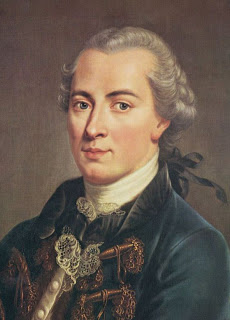Full Name: Immanuel Kant
Nickname: Kant
Father: Johann Georg Kant (1682–1746, harness maker)
Mother: Anna Regina Reuter (1697–1737)
Date of Birth: 22 April 1724
Birth Place: Königsberg, Prussia (now Russia)
Date of Death: 12 February 1804 (aged 79)
Death Place: Königsberg, Prussia
Cause of Death: Unspecified
Remains: Buried, Kaliningrad Cemetery Kaliningrad, Russia
Religion: Lutheran
Race or Ethnicity: White
Education: Saint George's Hospital School, University of Königsberg
Occupation: Philosopher
Region: Western philosophy
Professor: Philosophy at Königsberg, in Prussia
Main Interests: Epistemology, Metaphysics, Ethics, Logic.
Notable Ideas: Categorical imperative, Transcendental idealism, Synthetic a priori, Noumenon, Sapere Aude, Nebular hypothesis.
Influenced: Virtually all subsequent Western philosophy, including: Fichte, Schelling, Jacobi, Reinhold, Schiller, F. Schlegel, A. Schlegel, Hegel, Schopenhauer, Strauss, Putnam, McDowell, Durkheim, Simmel, Kelsen, Spir, Apel, Guyer, Seung.
Major Writing: Critique of Pure Reason (1781), Prolegomena (1773), What Is Enlightenment?, The Fundamental Principles of the Metaphysics of Ethics (1785) Groundwork of the Metaphysic of Morals (1785), Critique of Practical Reason (1788), Critique of Judgement (1790), Religion within the Bounds of Bare Reason (1793), Metaphysics of Morals (1797).
Early Life & Childhood: Immanuel Kant was born in the town of Königsberg, East Prussia (now
Kaliningrad, Russia), on April 22, 1724. He was the fourth of nine
children of his parents (Johann Georg Kant, Regina Dorothea Reuter). His
father was a harness maker. Their large family led a humble life. In
1740 Kant has admitted to the University of Königsberg where he read
philosophy, mathematics and the natural sciences. His father suffered a
stroke and died in 1746. He hadn't enough money to continue his
education. So, He became a private tutor for seven years. During this period
Kant published several papers that dealt with scientific questions.
In 1749, he published his first philosophical work, Thoughts on the True Estimation of Living Forces. The most important of them was the General Natural History and Theory of the Heavens which was published in 1755.
Later Life & Death: Kant spent the next fifteen years (1755–1770) as a lecturer on
Metaphysics and in 1770, He finally achieved a professorship at Königsberg 1770. His lectures made him internationally famous and he followed an
outstanding academic career with published works that became standards
in Western philosophy. At the age of fifty-seven Kant published the
first edition of the Critique of Pure Reason in 1781 and The Fundamental Principles of the Metaphysics of Ethics in 1785. His works include Prolegomena (1773) (better explain Critique of Pure Reason), Critique of Practical Reason (1788) and Critique of Judgment
(1790). Kant never married. He was a popular teacher and a modestly
successful author even before starting his major philosophical works.
On 12 February 1804, Kant died in Königsberg, Prussia at age of 79 and
he was buried in Kaliningrad Cemetery Kaliningrad, Russia.



0 Comments